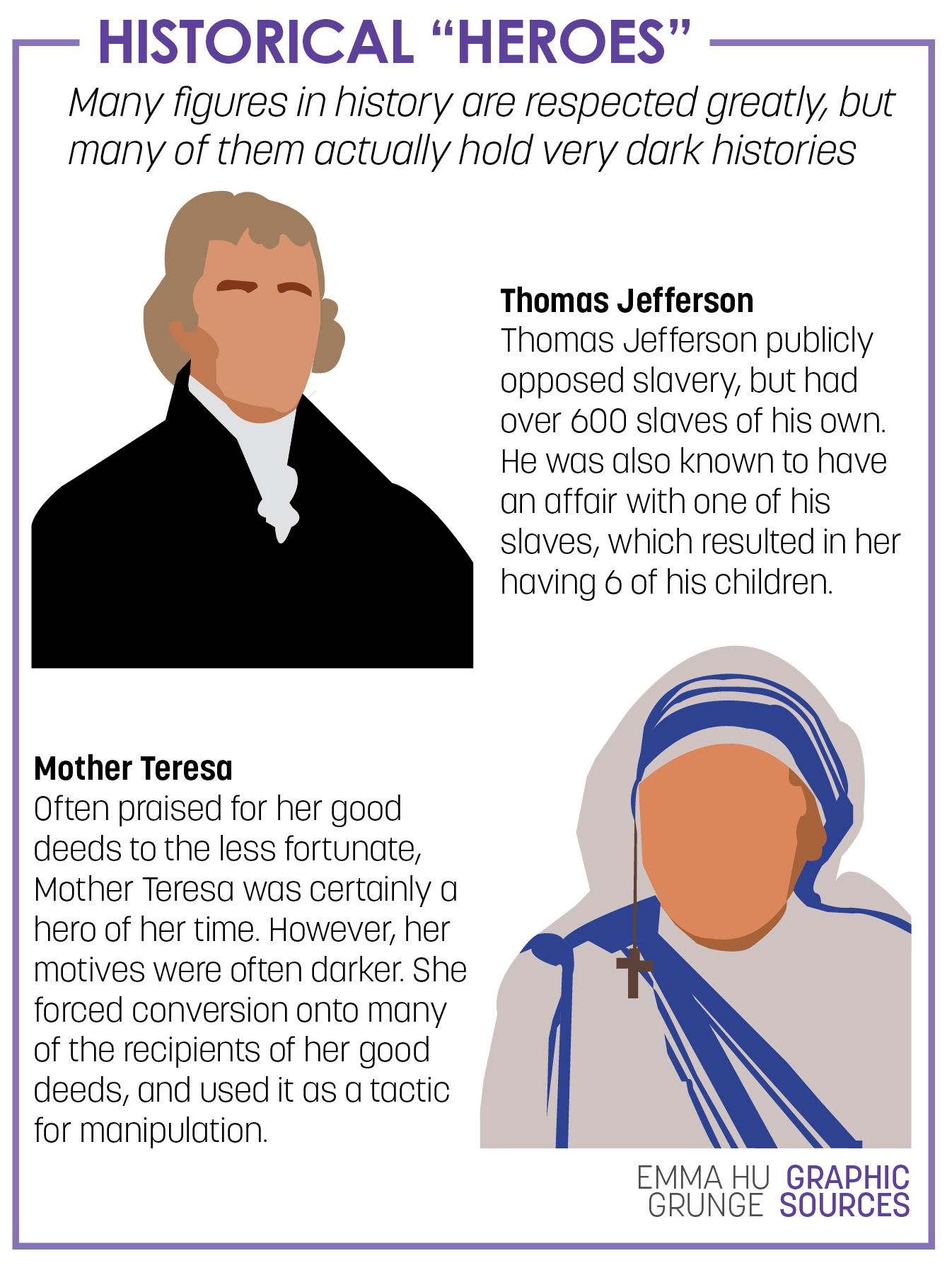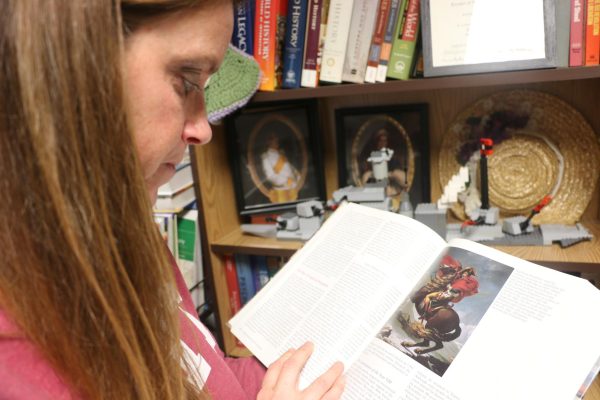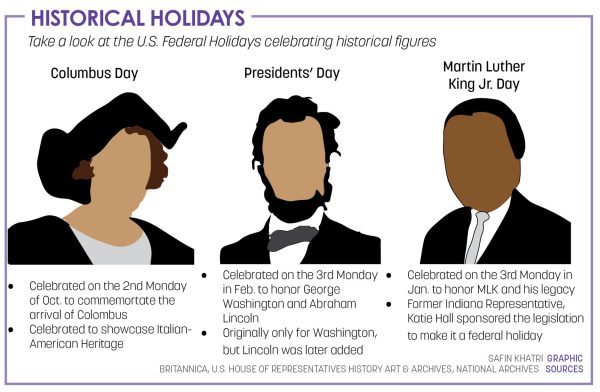Christopher Columbus, the famous Italian-born explorer, has received more backlash than ever in recent years. He went from being famous for discovering the Americas to being extremely famous for the discourse on if he actually discovered the Americas first. However, disputes about historical figures that may or may not deserve their fame aren’t limited to Columbus.
For example, senior Melaina Munson said John F. Kennedy’s (JFK) positive contributions as president are exaggerated.
“I think JFK is extremely overrated, personally. He wasn’t a bad president, but I think he’s worshiped in society because he was assassinated in a horrific way, so there’s a lot of empathy for him,” Munson said. “He’s seen as almost a national hero for dying for his country, but if you actually evaluate how he was as a president, he was not a super great leader. His foreign policy kind of sucked, and he caused the Cuban Missile Crisis in a lot of ways, and he didn’t handle it super well.”
Munson went on to say that if any other president had been involved with the Cuban Missile Crisis the way JFK was, the U.S.’s citizens would have hated them.

Jennifer Ellery, AP European History teacher, also said over-glorifying historical figures can cause people to overlook their more questionable policies, as they did with 19th-century Emperor Napoleon Bonaparte.
“(Napoleon) conquered all of Europe, so a lot of people just look at that, and they’re like, ‘That’s impressive, to take over an entire continent.’ However, there (are) a lot of nuances in terms of how he did it, how he treated the people, how he treated his own people in getting to that accomplishment and also just how he manipulated his own people into empowering him to the extent where he was even in the position to go and conquer all of Europe as an emperor, by honestly just manipulating their lack of awareness, their lack of education, their desperation for food was a huge thing,” Ellery said, “and so he did a lot of domestic programs for the people that were marginally helpful but made them really buy into what he was selling, but what they didn’t realize was that what he was selling was total domination over their lives and then (Napoleon) took it international and conquered a whole entire continent.”
Junior Ben Auslander added to this sentiment and said putting specific people on pedestals can draw attention away from others who deserve to be recognized.
Specifically in regards to the debate on Columbus Day, Auslander said, “I think that having a Columbus Day where we get school off, that’s basically accrediting him with all this stuff, and since he really doesn’t deserve it, it becomes a holiday for just a random guy. I don’t think that’s fair, especially because there’s so much that we have to learn about him on that day when in reality, we should be learning about other historical figures that are lesser-known.”
An example of a lesser-known person in history is Alice Paul, who Munson said deserves more credit than she gets. Paul was an American women’s rights activist and secured the ratification of the 19th constitutional amendment that made it legal for women to vote.
“I think that when we think about the women’s rights movement, the main character we think about is Susan B. Anthony, and while she did a lot of important work, Alice Paul getting left out of the conversation really hurts me, (especially because) she was the one that actually got women the 19th amendment and the right to vote, so that’s why she’s my favorite,” Munson said.
Ellery added on this when she talked about how the misconceptions of some historical figures simplified them into false characters.
“(Mary I was) totally manipulated by her heinous husband, Philip II of Spain. I mean, everybody knows the nickname, ‘Bloody Mary.’ There’s a little kids game (that) kids play, (where) she’s (portrayed as) this whole villainous, this heinous figure,” Ellery said. “Now I’m not excusing some of the things that she did, at the end of the day, you’re the boss, and when bad things happen in your country, you have to accept responsibility, so there’s that component. However, she was basically the puppet to the mastermind of Phillip.”

Bloody Mary is a common children’s game where ‘Bloody Mary’ is chanted three times to a mirror in the dark. Mary’s ghost will then supposedly haunt the chanter.
Ellery went on to say, “(Phillip) understood that she had a lot of emotional and mental weaknesses, based on her childhood, her upbringing, based on a lot of drama in her life,” Ellery added. “She was very sickly and really getting to an age where she was desperate because her dream was to be a wife, to rule alongside her king and to have children, and he knew all of this. She was Catholic, and he knew that. She was very, very, passionately Catholic, just like him. He kind of sold her this love story, this dream world that they would have, so that he could get the crown, so that he could be in charge of the country. With his leadership, he brings the entire Spanish Inquisition, (and) thousands of people will be murdered for not converting back to Catholicism.”

Munson expanded on the idea of a historical figure’s reputation being misrepresented by saying she also thinks a person’s last moments played a significant role in how they are remembered.
“I think that it has a lot to do with the impression you had at the end of your time in the limelight,” She said. “So I think that a lot of people when they did something really good right before they left, they get remembered super well.”
Looking forward, Auslander made predictions on the future of historical misinformation or over-glorification. He said with the prevalence of social media, everyone has an equal opportunity to make their voice heard, which makes it easier to take credit for what they have done.
Munson also said venerating specific people in history can have a negative impact on the public mindset and that a middle ground should be reached.
“I think that it’s important to be able to hold space for them having important contributions to society and also being able to criticize them in some way. I think when you over-glorify people, it makes it hard to recognize any criticism of their actions, and it makes it hard to grow and move forward as a society.”



